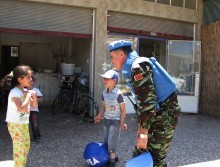The new year is upon us and Syria is still in the headlines. The United Nations is now saying 60,000 people have died in the nearly two-years-old conflict. But judging by the situation today, The Mideast Update predicts that 2013 will not follow 2012’s pattern of status quo fighting. No, this year will be very different. Here’s what Syria will become and why.
The US keeps calling the Bashar al-Assad regime desperate. The moniker certainly seems to fit. The opposition was supposed to be crushed by Assad’s vicious crackdown. That didn’t happen. Then the rebellion was to be put down by Assad’s powerful army. That didn’t happen either. Now? All Assad has left are literally the big guns and the depths of brutality.
So Assad fired Scud missiles on his own people in a truly shocking escalation. He bombed a Palestinian refugee camp. And there are even unsubstantiated rumors that he has started using chemical weapons in the fight.
What does all this mean? It means Assad knows his time to win is running out. The reality is that it already has.
In 2013, Assad will lose control over significant portions of Syria if he’s not deposed entirely. The country will be at least under fragmented control, and the Syrian opposition will muster an internationally-recognized authority over swaths of the nation.
The reaches of Assad’s desperation show how dark the situation is for him. His escalation of violence threatens to bring international intervention into play. The US has repeatedly made clear that using chemical weapons are a red line. That Syria was willing to use Scuds—just a step short of the kind of escalation the US warns was too far—proves he’s willing to risk almost anything, because he everything he has is already at risk.
The second reason to believe that Assad is going to lose control in 2013 is that the massive and brutal assaults on rebel strongholds have yet to drive out the rebels permanently. They lose numbers, even retreat, but he can’t defeat them.
And what’s more, the fight keeps reaching the capital in small but significant ways. That media reports keep speculating as to where Assad is currently hiding again speaks volumes about the desperate situation in which he finds himself. The capital is supposed to be the last bastion of strength for the government, yet it’s not longer safe for Assad to openly remain there.
Furthermore, the fact that the rebels have endured this long points strongly to the efficacy of international arms smuggling to them. And those nations who have apparently been sending them weapons aren’t likely to stop now. Letting Assad recover would be a dangerous situation for the region.
Assad’s ally, however, is weakening. Iran is under sanctions that make sending Assad weapons and human resources complicated at best. Assad’s enemies simply have an easier road to re-supplying.
That means that Assad’s one edge and hope—overwhelming forces that can win a war of attrition—no longer apply. One has to wonder how much longer it will take his armed forces and security teams to realize that too.
However, despite The Mideast Update’s expectation that Assad will lose power, it remains unclear exactly what Syria will be on December 31, 2013. Will Assad be able to maintain a corner of the country as Syria shatters into rivaling pieces?
Or will the country descend into Somalia-like chaos, with Assad controlling some parts, the opposition others, and terrorist war lords the rest?
Worse still, will significant portions of the country be effectively uninhabited due to chemical weapons attacks or carpet-bombing?
The West still needs to step up and make bold and clear threats to Assad to stop the bloodshed and back down—or else. They should also publicly arm the approved, non-terrorist opposition to make it clear that Assad can’t win.
Otherwise, Assad will go down and he could take many thousands more with him. In a State Department briefing this week, a reporter was quoted by a State press release as asking how many have to die before Assad reaches a death toll redline. The reporter wondered if half a million dead would be enough, or even one million.
Spokesperson Victoria Nuland dodged the question.
“You know where we are on Syria. We’ve talked about this at length. We are all watching this bloodshed, which is now into its second year, with revulsion and loathing,” Nuland was quoted as saying. “And it is the Assad regime that bears responsibility. They could end it and stop it at a moment’s notice and spare their own people. They bear responsibility.”
But Assad doesn’t bear the only responsibility. It’s time to stop dodging the questions. It’s time to speak loudly about the West’s big stick.
2013 is the year Syria will change forever. It’s up to the West to make sure that January 1, 2014 is full of hope and not regret.
(By Joshua Spurlock, www.themideastupdate.com, January 4, 2013)

